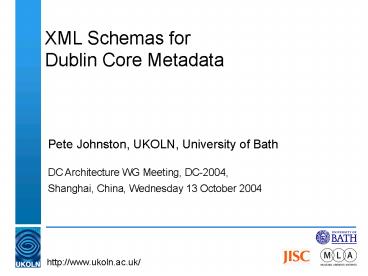XML Schemas for DC Metadata - PowerPoint PPT Presentation
Title:
XML Schemas for DC Metadata
Description:
... dcterms:provenance XML element invalid on Friday night, valid on Monday morning ... UKOLN is funded by the UK Museums, Libraries and Archives Council (MLA), the ... – PowerPoint PPT presentation
Number of Views:61
Avg rating:3.0/5.0
Title: XML Schemas for DC Metadata
1
XML Schemas for Dublin Core Metadata
Pete Johnston, UKOLN, University of Bath DC
Architecture WG Meeting, DC-2004, Shanghai,
China, Wednesday 13 October 2004
http//www.ukoln.ac.uk/
2
XML Schemas for Dublin Core Metadata
- Guidelines for Encoding DC in XML
- Conventions for representing DC metadata in XML
- Two sets of schemas
- Simple DC only (simple content model, used by
OAI-PMH oai_dc schema) - Qualified DC (more flexible content model, used
by various implementers) - Versioning
- Container elements
- The simpleLiteral type
- Abstract Model
3
Versioning
- Terms are continually added to the DCMI metadata
vocabularies as result of Usage Board decisions - DC Terms vocabulary
- DCMI Type Vocabulary (?)
- Requires changes to corresponding XML Schema to
provide XML component declaration - XML Schema used for structural validation
- Change to XML Schema may change validity of
instance - e.g. ltdctermsprovenancegt XML element invalid on
Friday night, valid on Monday morning
4
Versioning
- Currently
- URLs of all XML Schemas include datestamp
- User references specific version
- Must change references to access new version
- Request to be able to reference latest version
- Proposal
- Make available both latest version and
date-stamped versions - Impact
- Applications choose which to reference
- N.B. Must manage expectations re validation
accordingly
5
Container XML elements
- DC-in-XML Guidelines do not require use of
specific XML container element - Applications choose XML container element
- Request to provide container XML element(s)
associated with DCMI XML Namespace - Proposal
- Provide container XML elements corresponding to
description and description set in DCMI Abstract
Model - Question
- Separate container XML elements for Simple DC
description and Qualified DC description? - Or same XML element with different content
models? - What XML Namespace should be used?
- Also N.B. DC-in-XML doc adopts more restrictive
notion of Qualified DC than DCMI AM
6
SimpleLiteral Datatype
- dcSimpleLiteral complexType defined so as to
provide flexibility - Derive types based on simpleContent
- Derive types based on complexContent (with child
elements) - Derivation of complexType with simpleContent from
complexType with complexContent allowable in XML
Schema - But not supported by some parsers/processors
- Questions from implementers
- Some implementers do make use of derived types
based on complexContent
7
DC-in-XML Guidelines and DCMI Abstract Model
- (Not strictly a schema issue!)
- DC-in-XML guidelines pre-date DCMI Abstract Model
- Based on a simpler model of a DC metadata
description - Do not support
- resource URIs
- value URIs
- rich values
- related descriptions
- resource class URIs
- Value strings sometimes being interpreted as
value URIs
8
DC-in-XML Guidelines and DCMI Abstract Model
- Either
- Accept/emphasise current limitations
- Or
- Decide which features of DCMI AM should be
supported in syntax - Revise syntax accordingly (e.g. to distinguish
value strings and value URIs) - Produce new set of schemas
9
Acknowledgements
- UKOLN is funded by the UK Museums, Libraries and
Archives Council (MLA), the Joint Information
Systems Committee (JISC) of the UK higher and
further education funding councils, as well as by
project funding from the JISC and the European
Union. UKOLN also receives support from the
University of Bath where it is based. - http//www.ukoln.ac.uk/
10
XML Schemas for Dublin Core Metadata
Pete Johnston, UKOLN, University of Bath DC
Architecture WG Meeting, DC-2004, Shanghai,
China, Wednesday 13 October 2004
http//www.ukoln.ac.uk/































